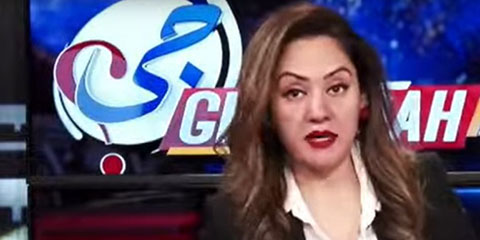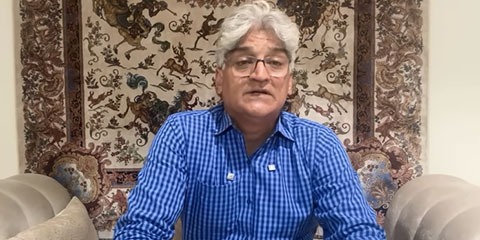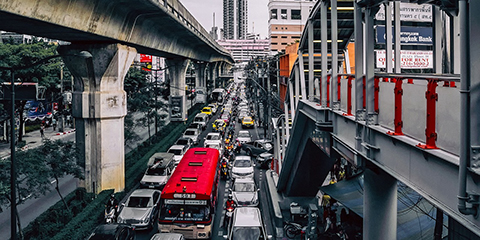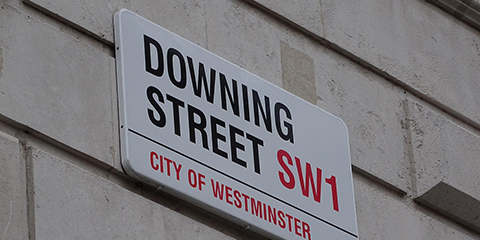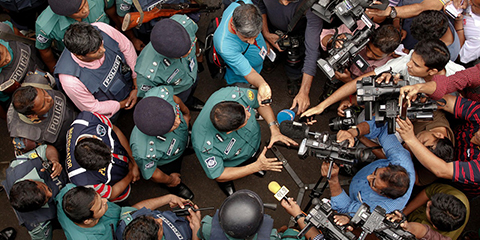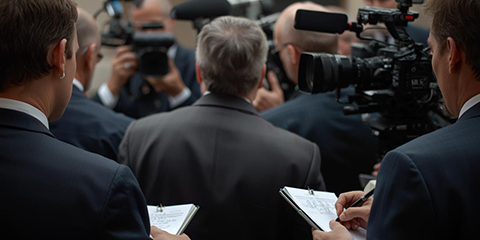PFUJ honors journalists flogged in 1978 for defending press freedom
JournalismPakistan.com | Published 7 months ago | PFUJ Media Release
Join our WhatsApp channel
ISLAMABAD—The Pakistan Federal Union of Journalists (PFUJ) has paid glowing tributes to the courageous journalists who endured harsh punishments while leading the movement for press freedom and free speech during General Ziaul Haq’s martial law regime in 1978.
In a joint statement issued on the anniversary of that dark day, PFUJ Acting President Khalid Khokhar and Secretary General Arshad Ansari said: "We salute the heroes of the Press Freedom Movement for their immense sacrifices given by them in 1978."
They remembered the historic resistance led by iconic journalist leaders Minhaj Barna and Nisar Osmani when General Zia imposed severe press restrictions, banned critical newspapers, and enforced strict censorship.
The movement began in Lahore, with journalists volunteering in groups of four to court arrest daily. As these groups marched down Abbott Road, crowds gathered to applaud them and chant slogans against martial law and in support of the press.
The arrested journalists were brought before military courts, but they refused to acknowledge the legitimacy of such trials, boldly telling the officers to impose any sentence they pleased as these courts were unconstitutional.
Despite increasing repression, the movement gained momentum. Journalists from across the country continued to offer arrests, filling jails throughout Punjab. Eventually, in an attempt to crush the defiance, the regime sentenced a group of four journalists on May 13, 1978, to imprisonment and five lashes each.
The journalists — Nasir Zaidi, Khawar Naeem Hashmi, Iqbal Jafri, and Masoodullah Khan — became symbols of resistance. Three of them were publicly flogged the same day inside Kot Lakhpat Jail. Masoodullah Khan was spared due to a medical exemption.
The military expected the whippings to end the protests, but instead, PFUJ responded with even greater resolve. The next day, the union leadership called for younger volunteers ready to withstand the brutal punishment. Overwhelmed by this defiance, the regime quickly revoked the flogging orders.
PFUJ praised these legendary journalists as a lasting source of inspiration for today’s media professionals.
Khokhar and Ansari declared: “The heroic sacrifices of Nasir Zaidi, Iqbal Jafri, Khawar Naeem Hashmi, and Masoodullah Khan will be remembered for generations.”
They also warned that Pakistan’s media is once again facing serious censorship and manipulation: “A culture of advice and misuse of law is once again rampant. We will not surrender before any authoritarian rule nor accept the restrictions being imposed on the media.”
The PFUJ leadership urged journalists to unite in defense of press freedom and free speech.
جرنلسٹس جنہوں نے ضیاء کے آمرانہ دور کا مقابلہ کیا، انہیں پی ایف یو جے کا خراج تحسین
اسلام آباد: پاکستان فیڈرل یونین آف جرنلسٹس نے ان صحافیوں کو زبردست خراجِ تحسین پیش کیا ہے جنہوں نے 1978 میں فوجی آمر جنرل ضیاء الحق کے مارشل لاء کے خلاف آزادیٔ صحافت اور اظہارِ رائے کی تحریک میں بے مثال قربانیاں دیں۔
پی ایف یو جے کے قائم مقام صدر خالد کھوکھر اور سیکرٹری جنرل ارشد انصاری نے ایک مشترکہ بیان میں کہا: "ہم آزادیٔ صحافت کی تحریک کے ان ہیروز کو سلام پیش کرتے ہیں جنہوں نے 1978 میں بے پناہ قربانیاں دیں۔"
بیان میں مزید کہا گیا کہ "پی ایف یو جے اُن تمام صحافیوں کی قربانیوں کا مقروض ہے جنہوں نے اس تحریک میں حصہ لیا، جو ممتاز صحافی رہنماؤں منہاج برنا اور نثار عثمانی کی قیادت میں شروع کی گئی۔"
یہ تحریک اس وقت کی پی ایف یو جے قیادت نے اس وقت شروع کی جب جنرل ضیاء الحق نے مارشل لاء نافذ کرکے تنقیدی اخبارات پر پابندی اور سنسرشپ مسلط کی۔
یہ تحریک لاہور سے شروع ہوئی اور ملک بھر سے صحافی روزانہ چار، چار افراد کے گروپ میں رضاکارانہ گرفتاری کے لیے آتے رہے۔ لاہور کی ایبٹ روڈ پر ہزاروں افراد ان صحافیوں کے لیے جمع ہوتے، ان کی حوصلہ افزائی کرتے اور مارشل لاء کے خلاف نعرے لگاتے۔
گرفتار صحافیوں کو لاہور کی فوجی عدالتوں میں پیش کیا گیا، لیکن صحافیوں نے ان عدالتوں کو ماننے سے انکار کر دیا اور جج حضرات کو صاف کہہ دیا کہ جو سزا دینی ہے دے دیں، کیونکہ یہ عدالتیں آئین کے خلاف ہیں اور ہم ان کو تسلیم نہیں کرتے۔
تحریک کی شدت بڑھتی گئی اور ملک بھر سے مزید صحافی گرفتاری کے لیے آنے لگے، جس کے بعد فوجی عدالتوں نے انہیں چھ ماہ سے دو سال تک قید کی سزائیں سنائیں اور انہیں مختلف جیلوں میں بھیج دیا گیا۔ پنجاب کی جیلیں صحافیوں سے بھر گئیں اور حکومت کے تمام حربے ناکام ہو گئے۔
بالآخر 13 مئی کو لاہور کی فوجی عدالت نے چار صحافیوں کو قید کی سزا کے ساتھ ساتھ پانچ، پانچ کوڑوں کی سزا بھی سنائی۔ ان صحافیوں میں ناصر زیدی، خاور نعیم ہاشمی، اقبال جعفری اور مسعود اللہ خان شامل تھے۔ عام طور پر کوڑے کچھ دن بعد مارے جاتے تھے، لیکن صحافیوں کو خوفزدہ کرنے کے لیے اسی روز کوٹ لکھپت جیل میں ناصر زیدی، خاور ہاشمی اور اقبال جعفری کو کوڑے مارے گئے۔ مسعود اللہ خان کو ان کی جسمانی معذوری کی وجہ سے معاف کر دیا گیا۔
فوجی حکومت کو امید تھی کہ اگلے دن کوئی صحافی گرفتاری دینے نہیں آئے گا، لیکن پی ایف یو جے کی قیادت نے اعلان کیا کہ تحریک جاری رہے گی۔ کوڑے مارنے کے بعد نوجوان صحافیوں کو گرفتاری کے لیے رضاکارانہ طور پر طلب کیا گیا تاکہ وہ سزاؤں کا سامنا کر سکیں۔ پی ایف یو جے کی اس جرات مندی نے جنرل ضیاء کو اگلے ہی دن کوڑوں کی سزا کا فیصلہ واپس لینے پر مجبور کر دیا۔
پی ایف یو جے نے ان صحافیوں کو اپنے اثاثے اور آج کے پرنٹ اور الیکٹرانک میڈیا کے لیے مشعلِ راہ قرار دیا۔
خالد کھوکھر اور ارشد انصاری نے کہا کہ ناصر زیدی، اقبال جعفری، خاور نعیم ہاشمی اور مسعود اللہ خان کی قربانیاں ہمیشہ یاد رکھی جائیں گی۔
پی ایف یو جے قیادت کا کہنا تھا کہ آج ایک بار پھر میڈیا بدترین سنسرشپ کا سامنا کر رہا ہے۔ "مشوروں کا کلچر اور قانون کا غلط استعمال پھر سے عام ہے۔ ہم کسی آمرانہ حکومت کے سامنے سر نہیں جھکائیں گے اور نہ ہی میڈیا پر عائد پابندیاں قبول کریں گے۔"
انہوں نے صحافیوں سے آزادیٔ اظہار اور صحافت کے تحفظ کے لیے اتحاد کی اپیل کی۔








